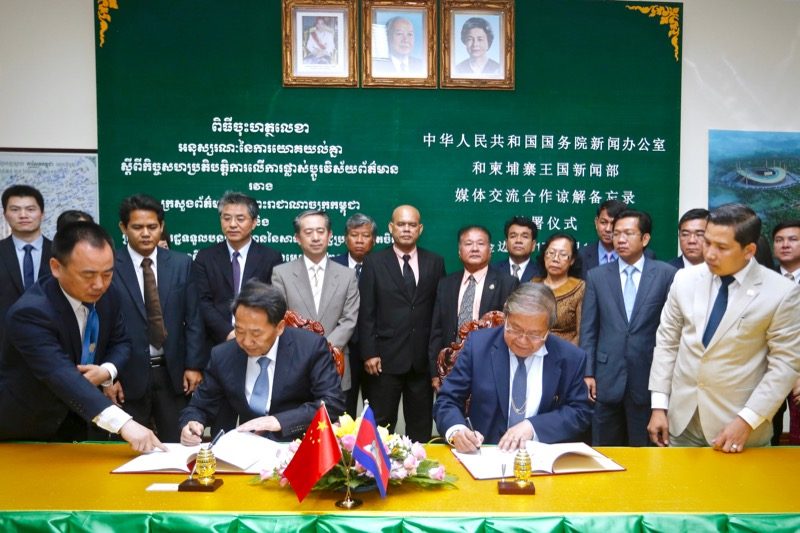Information Ministry officials and state-affiliated Cambodian journalists will receive training from and pay visits to their Chinese counterparts under a new agreement signed by the two countries on Monday.
Journalists and officials will be offered specialized reporting and technical training in China—which ranked near the bottom of the Reporters Without Borders’ 2016 World Press Freedom Index of 181 countries—according to the memorandum of understanding inked by Information Minister Khieu Kanharith and his Chinese counterpart Jiang Jieshi.

China “promised to do everything out of a desire to prepare a program of study for Cambodian experts,” said ministry spokesman Ouk Kimseng. The program will be open to private sector and state employees, he added.
Beijing will provide funding and technology for the exchange program, continuing its recent role as Cambodia’s largest donor. The cost of the program was not disclosed.
Chinese officials and media employees will also visit the Information Ministry and Cambodian media outlets, Mr. Kimseng said.
“The exchange of information focuses on political information, socioeconomics, culture and tourism, and will help us understand what we have in common,” he said.
The announcement follows a forum hosted in October by a senior propaganda officer for the Communist Party of China, who used the platform to call for increased collaboration and sharing of news between Cambodian and Chinese media.
Cambodia’s Khmer-language television, radio and newspapers are largely operated by the state or owners friendly to the CPP, according to research by the Cambodian Center for Independent Media and Reporters Without Borders.
But with the internet, and Facebook in particular, eclipsing TV as Cambodians’ top news source, according to an Asia Foundation survey last year, the Cambodian media landscape remains diverse compared to China’s.
“As well as building a Great Firewall to monitor and control blogs and social networks, the Communist Party exercises total control over China’s many media outlets,” Reporters Without Borders said on its website.
Political analyst Cham Bunthet said he was not surprised to see the Sino-Cambodian friendship stretch to media, with state-affiliated outlets in both countries pumping out sanctioned news.
“They have the same problems,” Mr. Bunthet said on Monday. “There are a lot of terrible things that haven’t been seen in the newspapers, television or radio. That’s the nature of media in Asia.”




